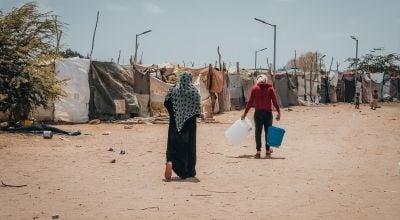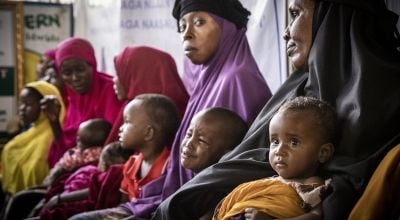
Read our 2023 annual report

Knowledge Hub
It has been 30 years since Concern began working in Rwanda, mounting an emergency humanitarian response to the horrific genocide of 1994.
Three decades ago, Concern’s aim was to reach hundreds of thousands of survivors with food, shelter, healthcare, and the practical support needed to begin to re-establish some sense of life and normality following the events of April 1994.
Thirty years on, we remain in Rwanda, but our work has changed. Rwanda has made remarkable progress since 1994, but chronic malnutrition and poverty still exist in the poorest provinces, with 38.2% of the population living in poverty and 16% in extreme poverty. We are supporting these communities with our innovative Graduation programme.
With the provision of cash transfers, coaching and mentoring, access to financial services and business skills training, participants are equipped with the tools, resources and opportunities to improve their lives and secure their livelihoods and incomes. Between 2017 and 2022, 2,700 vulnerable households in Gisagara district in southern Rwanda took part in our Graduation programme. Our new Green Graduation Programme launched in early 2023, and aims to reach 1,200 families living in extreme poverty in two districts.
Here are some of the stories of those supported by the Graduation programme, as well as an insight into the hope it can bring.
"I'm happy in my heart"
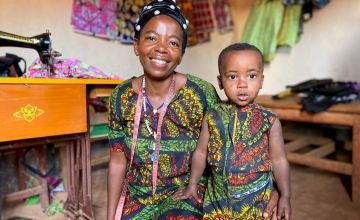
Life used to be very difficult for mother-of-three Alexia. She struggled to pay school fees for her two eldest children, leading them to miss out on classes. She would work on the farm as a casual labourer to earn money, but even when she managed to scrape an income, she was unable to put money aside for anything unexpected, like medicine for illnesses or new school supplies.
Then Alexia and her family were selected for Concern’s Graduation programme in 2019. As part of the programme, Alexia received training on income-generating activities, and decided that she would like to train as a tailor. With support from Concern, she invested in a sewing machine and received lessons in tailoring. Now, she makes up to 20 outfits a week for customers, and has developed five different patterns for women’s fashions as well as making men’s shirts.
“I chose sewing because it’s a skill that doesn't age and it’s a good way to earn a living,” Alexia explained. “I have children and it will be easy for them to pick it up too. I paid to learn these skills, but now, I will be able to teach my children myself. The business makes money every minute and every hour. I'm able to save some money and to take care of my children.”
I have dreams for my children.
As well as training in sewing, Alexia bought land to grow and cultivate rice, last year harvesting 300kgs of rice which she split between her family and those who worked on the land. She also owns a cow, three chickens and two sheep, which ensure that her children have plenty of milk and eggs to eat and drink.
Now, Alexia has her sights set on growing her business. She is taking lessons in hairdressing, and hopes to expand her tailoring business to include a salon.
“If it weren't for the programme, I would be so poor. I would be low,” Alexia said. “Life was not good. There's a change.
“I save so that if my child needs books tomorrow, I can go to the savings group to borrow money. If they need uniforms, I make them myself. There's a difference from before.
“I have dreams for my children. I will keep on saving so that my son who’s in secondary school goes on for mechanical studies. My daughter and I will work together in the salon and she will be next to me.” She added: “It’s going well. I’m happy in my heart.”
“The savings group helps us in good and bad situations"
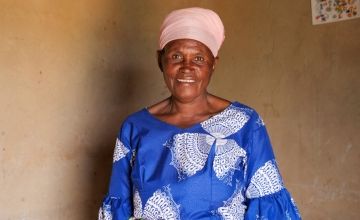
Anonciata and her five sons were forced to leave their home, as it was in an area at risk of landslide. While they found shelter to rent, the whole family slept in just one room, with nowhere to wash or cook a meal.
Their situation improved after Anonciata was chosen for the Graduation programme in 2020. Concern helped her to build a new house for her family, as well as providing the training and support to build further resilience.
Anonciata said: “After we moved in, [Concern] continued supporting us, the activities kept going. We learned about savings and loan groups. We continued with that group - it was so helpful. We received more training about how to care for our families, our children. They taught us how to cook a balanced meal so that our children have good nutrition. We received business and agricultural training and also how to take care of livestock. Then, we received money to buy livestock and to put into practice what we had learned. We've done everything we learned.”
When discussing the Graduation programme, it is clear that the village savings and loan association is the element that has made the biggest difference to Anonciata’s life. She is the accountant of her local savings and loan association, which is made up of 15 people, and she has been able to borrow from the group to rent land - thus providing her with crops to sell at market.
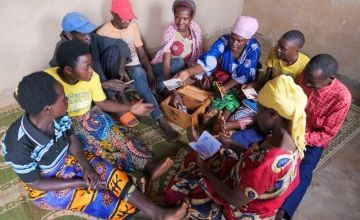
“The savings group helped us a lot,” Anonciara explained. “We're able to rent land so we can grow crops. We have learned to use fertiliser. The fertiliser from our livestock helps us with our harvests. Even when some things don't go well, such as when some of our livestock died, we continue on. We aren't discouraged. We have goats, rabbits and pigs. Whatever crops we grow, we can harvest. That's how the group is proceeding. We are still helping each other.
“[The savings group] helps us pay for our health insurance. It helps us provide school meals and uniforms for the children. Whenever you have an issue, you can borrow some money. If you need to rent a plot of land, you can borrow money and then as you farm you can repay it slowly. Some of us didn't have electricity in our houses. But we were able to buy electricity so that we have light. When you need fertiliser, you can borrow money from the savings group. If you have an issue at hospital, you can depend on the savings group to help. You buy clothes if you need them.
"There are a lot of things that the group can help you with. The savings group helps us in good and bad situations."
“It gave me hope to take care of my brother”
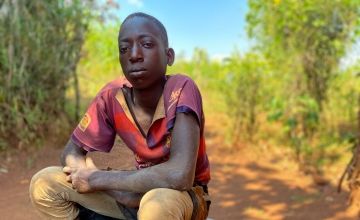
Among those selected to participate in the Green Graduation programme are Theogene, 16, and his 12-year-old brother. They were left to live on their own eight years ago, and now Theogene is his younger brother’s caregiver.
“Sometimes, it's hard to find food. But there's no other way,” Theogene said. “Things are not going well. I tell my little brother to go to sleep. Then the next morning, I will go and look for a job so that he gets food and doesn’t starve. And I search. If someone sends me to fetch water, I go. If it's for firewood, I go and get it so that I can feed my little brother, so that we continue living this life. When I eat, it gives me strength to take care of my brother until he is grown up. I always put a lot of energy into caring for him.”
Theogene and his brother previously lived in a small house, but it was destroyed by heavy rains. Thankfully, their community is very supportive, and helped them rebuild their shelter with iron sheets. They also give Theogene regular small jobs in exchange for food or a share of their harvest.
Being selected for the programme has brought me hope for the future. I will be an important person one day.
However, there is hope on the horizon. Having been selected for the next round of the Graduation programme, Theogene plans to use the assistance he gets to send his brother to school, and to buy livestock. He says he will let neighbours use the manure, “because they helped me when I was in need”.
“When I was selected, it gave me hope to take care of my brother,” Theogene said. “It will enable me to send my brother to school. It will help me renovate this house. It will give me an opportunity to start a business to sell things. If I receive support, I will buy livestock, like a cow or goat. I will be able to buy soap instead of wearing dirty clothes, and buy shoes, books and a uniform for my brother for school.
“When I have a business, I will have a cow and other livestock and will use the opportunity of having manure to help cultivate cassava, beans and millet. And once we have a harvest, we will keep some and sell the rest at market.”
Theogene is using this support not only to provide immediate care to his brother, but to give back to the community and build a future for his family. “I am happy. Being selected for the programme has brought me hope for the future. I will be an important person one day. I will help other people who aren't able to be part of this programme. I will support them. I will tell them about how Concern helped me, and that I now have something to give back to them.”



